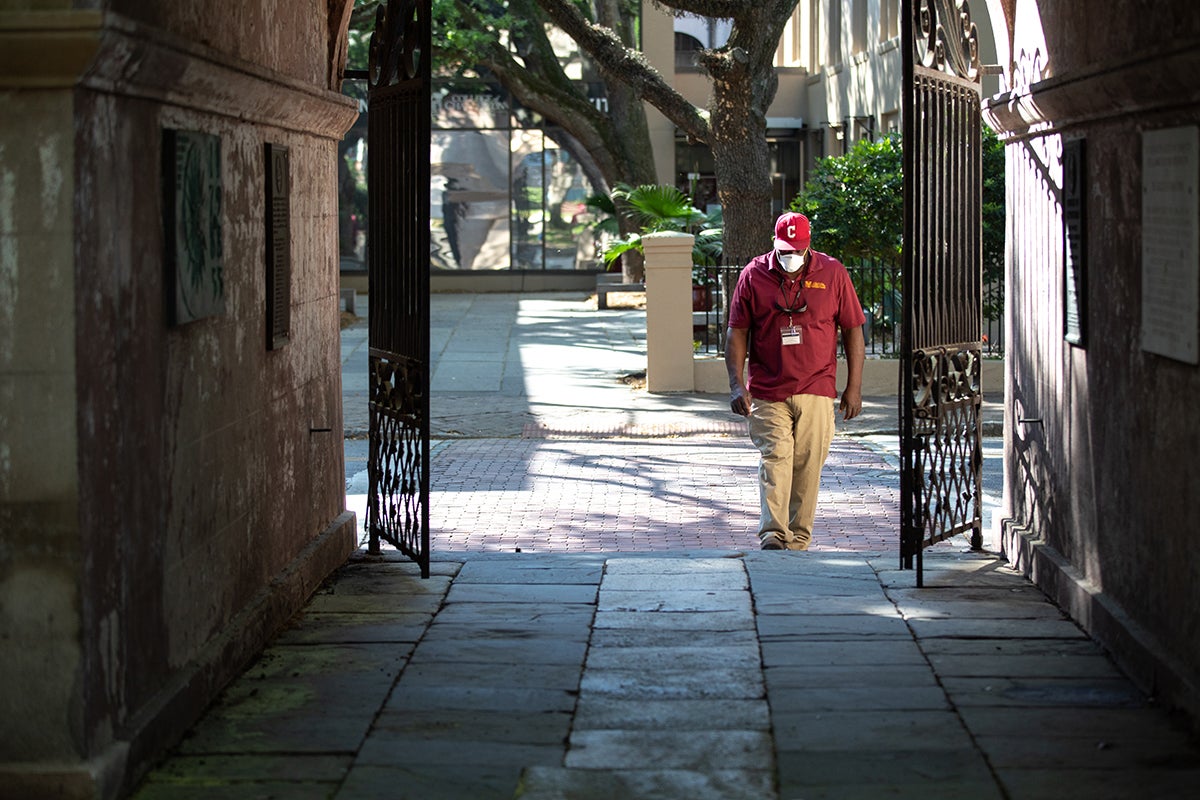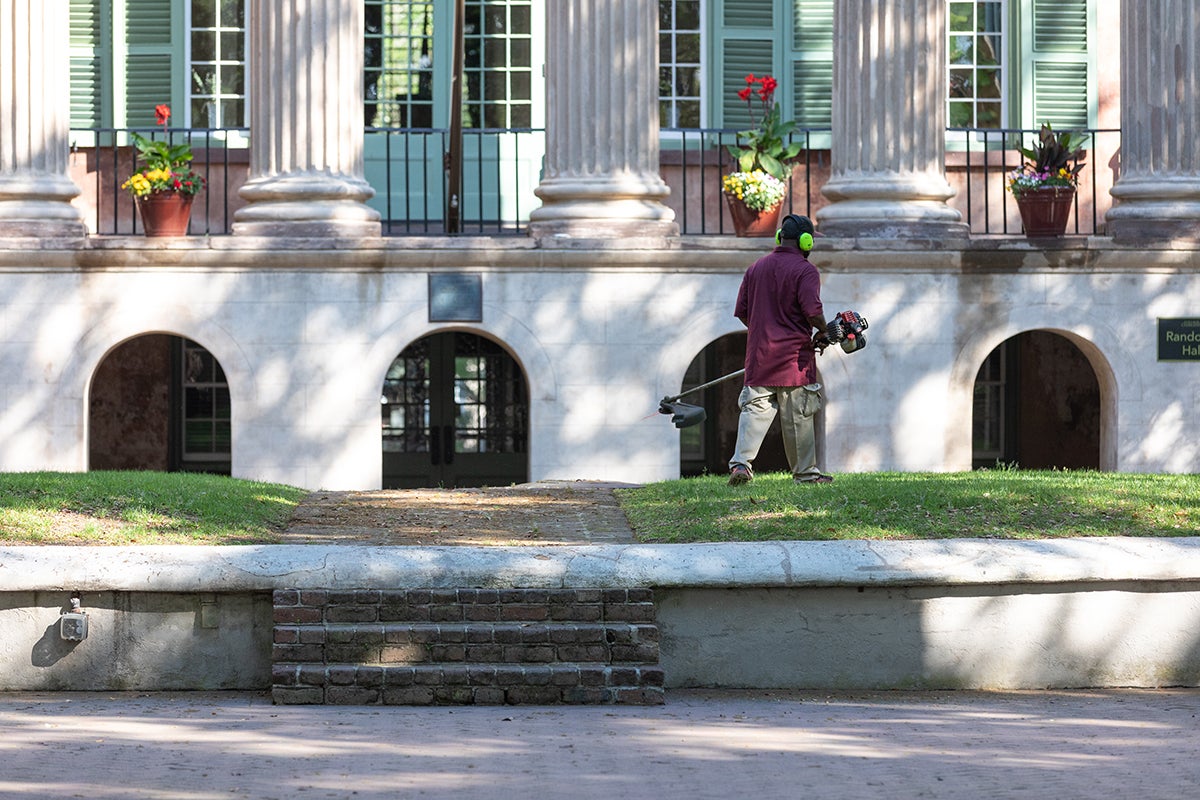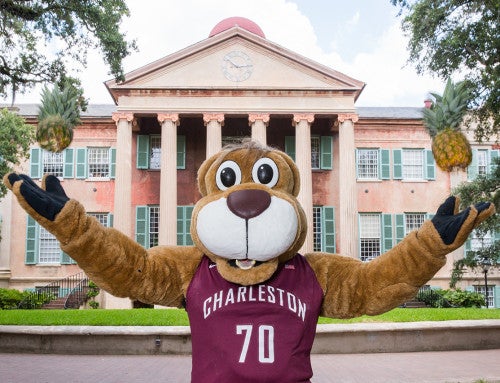It’s hard for the majority of College of Charleston staff and faculty to imagine the campus without thousands of people – without the movement and sound and energy that come together to define the CofC community. But, for the Facilities Management staff members who have bravely continued coming to work since the pandemic began, an empty, quiet campus has become the reality.
“It’s a whole different place – the vitality is gone,” says Cristi Schultz, director of architecture and engineering. “It’s surreal.”
“I never thought I would ever witness something like this in my lifetime,” agrees Wilfred Fields, associate director of maintenance and operations, adding that about 95 percent of his crew is still coming to campus. “My staff has some mixed emotions, but they’re plowing through. They’re commendable for their effort and willingness to push through this.”
And they’re not alone – between Custodial Services, Central Energy Plant, Grounds Crew, the HVAC Shop and other work units, there are about 110 Facilities Management staff members working hard to keep campus going.
“We have some dedicated staff in Facilities Management who continue to show up daily in spite of their fears, having kids at home, having people they want to be home with,” says John Morris, vice president of Facilities Management. “But we continue to do our best to keep the campus buildings operating, doing deep cleaning, working with contractors and ensuring our staff are current on personal protective equipment.”
In addition to gloves and masks, the 110 Facilities Management staff members on campus are washing their hands every 30 minutes, keeping 6 feet away from one another and stepping up the frequency of disinfection and sanitization of campus buildings and equipment, too.
The extra measures aren’t just to protect themselves and one another, though: They are doing it all for the safety of the entire campus community. For Custodial Services, for example, this means thoroughly and meticulously wiping down the walls, cleaning the tiles on the ceilings, shampooing the carpets and more.
“With everybody gone, we can do deep cleaning and be really thorough,” says Tony Rose, custodial supervisor, adding that he is proud of the Custodial Services staff. “I really appreciate my team: They come in, do their jobs, get it done and then start all over the next day. They really are working hard.”
Indeed, everyone on campus seems to be working hard. And for most, it’s business as usual.

CofC Carpenter Keith Prioleau builds a plant shelter for the Groundskeeping department at 45 Coming Street during the 2020 COVID-19 pandemic.
“There’s been no real change in operations for us,” says John Gilley, director of utility services. “Even if the whole world stops, we keep going.”
That’s especially true at the Central Energy Plant, which must stay in operation 24/7.
“We have to be here – we’re not going anywhere!” says Milton Summers, deputy director of central energy. “I’m proud of these guys – their morale is high. They all accept that they have to be here, doing their jobs just like usual – watching the steam, the air conditioning and refrigeration – so that it’s comfortable and safe for everybody. We try to keep y’all warm in the winter and cool in the summer!”
This is the time of year, of course, when the grounds crew would typically be in the throes of preparing for A Charleston Affair and spring commencement. When those two events were cancelled, however, the team didn’t blink an eye.
“Right now we’re taking all the flowers from graduation that we ordered and putting them in the planters on campus. We’re preparing the normal annual beds and baskets, and we’re creating some new annual beds,” says Verneil Phillips, grounds manager, adding that – for added protection – his team members are using the same tools all day rather than using one and then putting it down for another crew member to use. They are also limiting one person to a cart. “We have adapted, but we haven’t stopped. Campus is still here, there are still projects to get done, we still have to make campus beautiful.”
Building maintenance has also continued without a hiccup, with projects like repairing the roof at TD Arena, replacing a sewage tank at WestEdge, fixing the exterior siding at 9 College Way, restoring and painting 2 Green Way and making adjustments at the Rita Liddy Hollings Science Center.

Eric Redden of Facilities Management replaces drawer slides on a vanity dresser in McAlister Hall during the 2020 COVID-19 pandemic.
And the larger projects – renovations like the astronomy deck at the science center, the restrooms and courtyard at Craig Hall, the Parking Services and Cougar Card Services space at Berry Hall, the Physical Plant building, the Chapel Theatre/Calhoun Annex and Sottile Theatre – are plowing ahead as well.
“We’re also in the design phase of the Simons Center for the Arts renovation and the approval phase of the McAlister Residence Hall renovation,” says Matt Schram, a project manager in the architecture and engineering department. “Not to mention multiple historic housing projects, steam and chilled water infrastructure work, classroom refresh work, mechanical upgrades at various locations and a variety of projects at multiple residence halls.”
“They’re doing all of this and also dealing with the personal anxieties we’re all dealing with,” says Morris. “It’s a lot to juggle, and I know it’s not easy for them. I’m proud of their dedication and commitment during these challenging times.”
Of course, as many of us have learned lately, with challenge comes opportunity – and Facilities Management is taking this opportunity to tackle jobs they normally can’t get done, as well.
“We’re taking advantage of getting into spaces that we can’t get into otherwise,” says Frank Covington, director of facility operations, explaining that – because offices, classrooms and residence halls are almost always occupied – there are only very small windows to accomplish tasks like checking ceilings, cleaning the blinds, scraping old wax off floors and pressure washing. “This has given us the time to get in there and do thorough building inspections, make sure things are all in good shape, fix problems and do some general maintenance.”
There’s also a limit to how much noise you can make – and, says Summers, central energy jobs can make a lot of noise.
“There are things we can’t get to because students are in the classrooms, and everyone is trying to study and work,” he says. “So now we have the time that we can get things done and catch up on fixing things that we couldn’t otherwise. We’re getting a lot done. There’s noise everywhere now!”
Some of that noise is coming from the Grounds Crew’s blowers.
“We can run blowers anytime!” says Phillips, adding that his crew rarely has the chance to go right up to the sides of the buildings and blow away the leaves and debris. “This is a good time for that – not just because there’s nobody to disturb, but because this is when all the leaves of the live oaks are falling. So, there’s a lot to do.”
And there’s always a lot to do when it comes to cleaning up and maintaining the grounds – leaves are always falling, plants and grass are always growing.
“That alone keeps us busy,” says Phillips, who has spent his first year at the College shaping up overgrown beds and shrubbery. “There hasn’t been time to really have my own vision. Now that people are gone, it gives me a chance to take a step back and visualize things. So, with this time where campus is empty, I’m getting to put my touch on the landscaping.”
“Y’all are going to be amazed when you get back at some of the things that we’ve been doing – campus is looking beautiful,” says Summers. “We’re keeping things going so it’s comfortable and safe for everybody when you get back, too. But we’re missing the kids, all the staff.”
And that’s another hidden upside to these strange, uncertain times: Being apart for so long might just bring us together in the end.
“To some extent, this whole experience will be good for everyone, because it will make them appreciative of their colleagues,” says Phillips. “Things like this help you really find out how much you appreciate having all the people around and how much you really love working at the College.”









